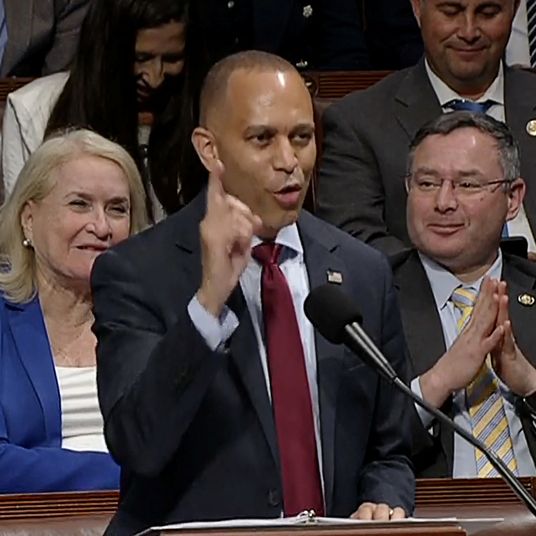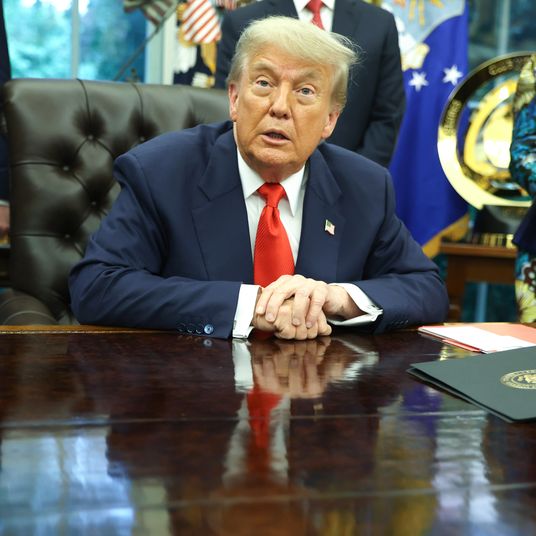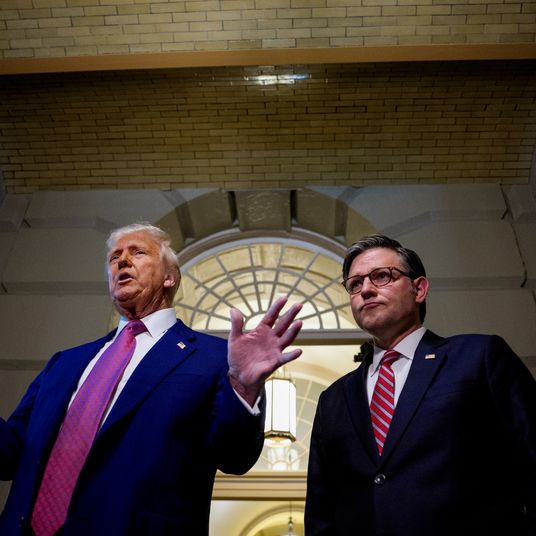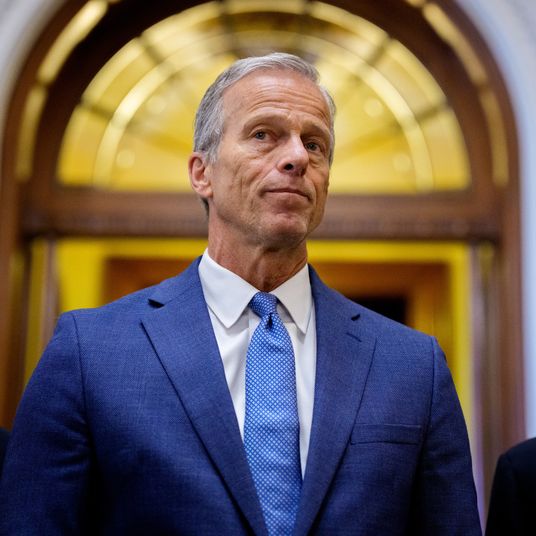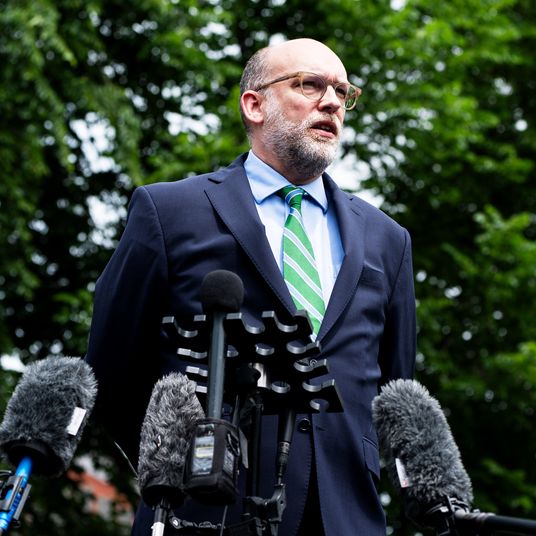
As the drama over Donald Trump’s One Big Beautiful bill approaches its climax this week, there’s been lots of complaining among House and Senate Republicans about various provisions. You might even conclude the megabill is in trouble. But the battle over the budget-reconciliation bill is really like a game of musical chairs: Republicans are free to posture and maneuver and bitch and moan about the bill until the moment Trump stops the music and they all (or nearly all) vote “aye.” It’s happened over and over again during the long and tedious process that led to this moment, and there’s no reason to think the basic dynamic has changed.
But there has been one truly surprising development during the last few days: Instead of quietly swallowing his objections to the megabill (particularly its Medicaid cuts), North Carolina senator Thom Tillis abruptly announced he is leaving the Senate when his term ends in 2026. So instead of having a tiny bit of leverage over the megabill as a vulnerable 2026 Senate reelection candidate, Tillis is now out of action and irrelevant. He is free to vote “no” on the bill, as he presumably will unless he decides he wants an ambassadorship or something.
Republicans can afford to lose Tillis as long as total Senate defections are held to three. (Tillis joined the incorrigible Rand Paul in voting against the motion to formally take up the bill, which led to Trump threatening to back a primary bid against Tillis, triggering his retirement announcement.) Who else will be brave enough to rebel or perhaps lucky enough to get a “pass” on backing this terrible legislation? Perhaps Susan Collins, who is up for reelection next year in a state carried by Kamala Harris in 2024? Possibly Ron Johnson, the Senate’s counterpart to the House Freedom Caucus deficit hawks? The one thing we know for sure is that the managers of this legislation will go to great lengths to make sure it passes, as they did when they basically exempted Lisa Murkowski’s Alaska from SNAP cuts, in that would have hit her state harder than any other.
But congressional Republicans must soon end the deal-cutting and go with whatever they’ve got. And indeed, they don’t have to buy off every potential defector with changes in the bill. Instead, they are focused on creating and reinforcing a narrative about it that may be a pack of lies but will be accepted by the GOP base, conservative media, and just enough swing voters to neutralize some of its negative effects. It’s a matter of marketing as much as persuasion. Here are the key elements of the Republican BBB mythology that have emerged as the bill gets closer to final passage:
- The bill doesn’t shred the social safety net: It strengthens it by disqualifying undeserving people. The Congressional Budget Office says that by imposing work requirements on Medicaid beneficiaries and limiting state use of provider taxes to pay for the program, the bill will cost 11 million Americans their health-insurance coverage. But according to the GOP party line, these are just reforms to prevent “waste, fraud, and abuse” and to solidify benefits for those who truly need them (i.e., those who were receiving Medicaid before the Affordable Care Act expanded eligibility). Thus, Trump and many of his allies can claim they kept their promise not to pursue Medicaid “cuts.” Similarly, SNAP cuts that link a massive cost shift to the states, leading inevitably to benefit cuts, are allegedly designed to address wasteful inefficiencies in how states manage these benefits. Supposedly, no one will be hurt who doesn’t deserve it.
- The bill prevents taxes from increasing while keeping Trump’s promises for new middle-class tax cuts. Trump’s 2017 tax cuts, heavily skewed toward the wealthy and corporations, were designed to expire in 2025 in order to reduce the red ink associated with them. Now, Republicans want them extended and even made permanent since letting tax rates go back to where they were in 2017 would be a “tax increase.” So the wealthy and corporations get a new lease on lower rates along with some new tax benefits, masked by limited versions of a few “middle-class tax cuts” Trump promised on the campaign trail in 2024 (no tax on tips, reduced tax on overtime, a new tax deduction for seniors). One notable new tax cut for upper-middle-class individuals in high-tax states, a major increase in the SALT deduction, was forced into the bill by House Republicans, who will carry it onto the 2026 campaign trail like a trophy.
- The bill avoids a debt default and reduces budget deficits. The former assertion is true since the bill increases the public debt limit, which is the key reason the legislation needs to be finalized soon (the country could hit that debt limit by late August). The latter assertion is a howler: CBO estimates the bill will spill $3.3 trillion in new red ink. To hide that reality, Senate Republicans have approved an accounting trick that makes $3.8 trillion in extended tax cuts free from a budgetary point of view. It’s an especially blatant lie, but it’s essential for the marketing of the legislation. For House deficit hawks who don’t buy this nonsense, House Speaker Mike Johnson has been suggesting he would pursue a second budget-reconciliation bill late this year to further cut spending. This extremely dubious proposition represents a fig leaf for House Freedom Caucus types to hide the hypocrisy of their upcoming votes for the megabill.
The emerging shape of the reconciliation bill and the hardening narratives about its implications can get lost in the daily back-and-forth of talk about Republican divisions, and in the intrinsic complexity of the congressional budget process being utilized. On Monday the Senate is going through the Kabuki theater of a “vote-a-rama” in which Democrats are allowed to offer a high-speed series of amendments to the bill, mostly just to force Republicans to go on record as backing some of its more unsavory provisions. Assuming the Senate passes the bill, we’ll have a day or two of posturing by House members outraged by specific provisions of the Senate bill, before it inevitably passes that chamber by the narrowest possible margin. There could be a last-minute arithmetic problem caused by House members falling ill or missing flight connections, but at present it looks like Trump will get his Independence Day present of a megabill on his desk by the end of the week. The rest of the noise surrounding this legislative monster will soon fade, and Congress will redirect its energies to reelecting itself in 2026. Thom Tillis can watch the whole show from a comfortable distance.
More on Politics
- Poll Shows Public Knows Little About Trump’s Ugly Megabill
- Trump Betrayed His Base With the Big Beautiful Bill, and the GOP Will Regret It
- No President Has Ever Had Something Like Trump’s Megabill

